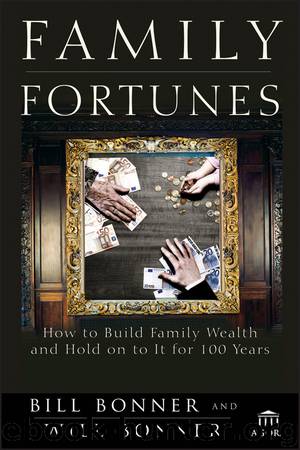Family Fortunes by Bill Bonner & Will Bonner

Author:Bill Bonner & Will Bonner
Language: eng
Format: epub
Publisher: John Wiley & Sons, Ltd.
Published: 2012-06-16T16:00:00+00:00
STAY IN SCHOOL?
To turn to a more common example, what about the child who is destined to enter the family firm? Is he better off spending more time in school or going right to work? Almost every parent would say, “Let him stay in school as long as possible.” If pushed to identify the merits of further education, the parent would say, “It can’t hurt.”
But maybe it can hurt.
People learn, no matter where they are and what they do. So the real question is, where are they likely to learn more, or which kind of learning will be more valuable?
Book learning has a value, especially in the sciences. But if the hypothesis of “Compound Effort Over Time” is correct, it may be more valuable to begin early accumulating the instincts, experience, and hunches that prove so valuable in real life. Plus, not only may time spent in school be less productive, it may undermine the process of accumulating real and useful knowledge.
Much of what is taught—depending on the discipline—is not knowledge at all. It is nothing more than intellectually fashionable claptrap that later proves to be completely false. Imagine the poor family that sends a child to an Ivy League school so that he may get a degree in economics or finance. Then it sends him to a business school so he may deepen his understanding of the subject. By the time the kid finishes school, the family has spent nearly $300,000 on his education.
Then, when his studies are finally completed, he comes back and applies the latest theories of finance to the family fortune. Had he arrived on the scene in 2005–2007, for example, he might have loaded up the family with a portfolio of mortgaged-backed derivatives, in order to earn higher yields from “safe” investments. He might have applied modern portfolio theory, too, and wiped out half the family fortune.
Or maybe he would have turned his education to the business itself. You can imagine him telling dad and the old-timers that there were new and better ways to do things and that they should be trying to “maximize shareholder value” by leveraging the firm.
The old-timers would shake their heads.
“No . . . debt doesn’t seem like a good idea. . . .” they would say.
Or: “Hmmm . . . something doesn’t seem right. . . .”
But asked to explain why they were reluctant to put the new learning to work, they would have a hard time arguing the point. They would have only hunches and habits, the accumulated wisdom of decades; it wouldn’t stand up for long against the mathematical proofs offered by the young MBA!
Finally, the old guard would give up:
“Well, I guess you’re right. We can increase our return on equity by borrowing money . . . I guess that makes sense.”
And it did make sense—for a while. In 2006, the firm might have been more profitable than ever . . . and maybe even have bought a corporate jet and begun expanding into new markets.
“Well, I guess Sonny was right,” the old man could say to himself.
Download
This site does not store any files on its server. We only index and link to content provided by other sites. Please contact the content providers to delete copyright contents if any and email us, we'll remove relevant links or contents immediately.
Rich Dad Poor Dad by Robert T. Kiyosaki(6637)
Pioneering Portfolio Management by David F. Swensen(6301)
How To Win Friends and Influence People by Dale Carnegie(4513)
The Money Culture by Michael Lewis(4208)
The Dhandho Investor by Mohnish Pabrai(3767)
The Wisdom of Finance by Mihir Desai(3749)
Liar's Poker by Michael Lewis(3450)
Fooled by Randomness: The Hidden Role of Chance in Life and in the Markets by Nassim Nicholas Taleb(3124)
The ONE Thing by Gary Keller(3072)
Mastering Bitcoin: Programming the Open Blockchain by Andreas M. Antonopoulos(3046)
The Intelligent Investor by Benjamin Graham Jason Zweig(3043)
The Psychology of Money by Morgan Housel(3037)
Rich Dad Poor Dad: What The Rich Teach Their Kids About Money - That The Poor And Middle Class Do Not! by Robert T. Kiyosaki(2958)
Investing For Dummies by Eric Tyson(2955)
How to Day Trade for a Living: Tools, Tactics, Money Management, Discipline and Trading Psychology by Andrew Aziz(2949)
How to Win Friends and Influence People by Dale Carnegie(2918)
Market Wizards by Jack D. Schwager(2702)
How to Pay Zero Taxes, 2018 by Jeff A. Schnepper(2655)
Zero Hour by Harry S. Dent Jr. & Andrew Pancholi(2649)
